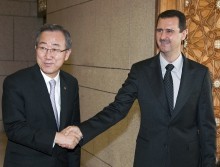
Could Syria’s President bring together unlikely allies? Syrian President Bashar al-Assad (right) shakes hands with UN Secretary-General Ban Ki-moon (left). Illustrative. Photo Courtesy of UN Photo/Eskinder Debebe.
The Syrian civil war has turned into a power vacuum pulling in fighters from all directions and many nations, with many of them fighting each other in which there are at least three or four sides in the conflict. Yet perhaps the most divisive mini-world war in recent memory may also be the stepping-stone that pulls three regional powers together ahead of the greatest battle of all time.
Iran, Turkey, and Russia have long held conflicting views. Turkey was once the Muslim darling of the West, and has been home to US missiles and strategic military facilities. That naturally put it at odds with Russia, who has battled the US off and on diplomatically, or even militarily, for 70 years. And Russia represents a secular superpower, while Iran is seeking to usher in an era of Islamic dominance, as Al-Monitor recently pointed out in a report on those two nations’ relationship. Yet despite the differences, one expert sees Syria as a place where they share interests—at the expense of the United States.
Aaron David Miller, a former Middle East negotiator, commented on his Twitter feed recently that “3 serious powers(Russia/Iran/Turkey) now on the ground in Syria. Their positions cld align better w/one another than w/US.” It certainly doesn’t hurt that all three of them aren’t friendly towards the US right now.
Iran and Russia have longstanding animosity towards the Americans, but the Turks have been demanding that the US hand over a cleric living in America that Turkey’s government believed was a key part of the failed countries with generic viagra coup in that country earlier this summer. Not exactly a relationship-builder.
Meanwhile, Miller noted on Twitter that Turkey’s interests—which include battling an ISIS opponent that recently bombed a Turkish wedding—could bring them to working with a former friend turned enemy, Syrian President Bashar al-Assad. It so happens that Assad is also allies with Iran and Russia.
Nonetheless, Miller doesn’t think Iran and Russia will really become allies themselves. He tweeted that the conflict in Syria “means overlapping interests,” for Russia and Iran, but “history ensures can’t be allies.”
Miller posted that Tweet in view of Iran suspending its brief use of an Iranian air base to bomb Syria. The cause of that shift in tactics—whether it was push back from Iran or logistical reasons—is unclear noted the Al-Monitor article.
An Iranian official, meanwhile, portrayed it as simply the end of that Russian mission. Secretary of the Supreme National Security Council Ali Shamkahni, in an interview with RT Arabic and published in English by Iran’s PressTV, said it was “possible” that the Russian military could return to Iran as a base for fighting in Syria.
In the end, it’s unclear if Iran, Russia, and Turkey can really align. But the Bible indicates the three nations might very well end up on the same side in the massive global fight in the end times prophesied in Ezekiel. Depending on which expert you read (such as Joel Rosenberg) Russia and/or Turkey, along with Iran, could be among the array of nations whose ancient names are listed in the Biblical text.
And if a war in the Middle East can unite them now, that just might set the stage for another one later.
(By Joshua Spurlock, www.themideastupdate.com, August 30, 2016)
